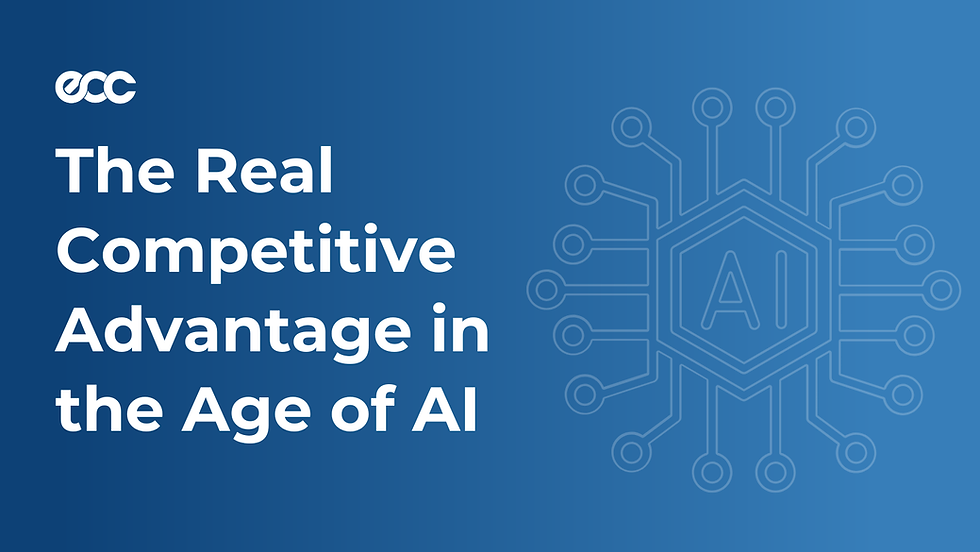Harmonious Organisations: How purpose-driven leaders build organisations based on love not fear
- Apr 29, 2024
- 4 min read
In the fast-paced realm of modern business, where the bottom line often takes precedence, a new paradigm is emerging—one that places purpose at the forefront of leadership. Today’s leaders foster environments where everyone can thrive.
At European Customer Consultancy (ECC), we help leaders create harmonious workplaces where synergy flourishes and individuals are enabled and empowered to reach their full potential. Recently, Olga Potaptseva, founder & CEO of ECC, had the pleasure of hosting Carlien Cavens, Founder & Executive Coach at Unplug48, for a discussion on the essence of purpose-driven leadership.
The two most essential takeaways any leader looking for business harmony should think about are:
Define your authentic belief
Good leaders need to firmly believe in the higher purpose of what they're doing and bring enthusiasm, clear direction, and focus to their teams. At its essence, leadership purpose emanates from one's identity, representing the core of who they are. It's not merely a compilation of one's education, experience, and skills acquired throughout life. The success of a company often relies on the vision set by its leaders and great visions always strive for making the people and societies better.
“Only when leaders authentically champion customer-centricity can they inspire and guide their teams effectively.” - Olga Potaptseva, CEO & Founder, ECC.

Harvard Business Review notes that there has been a significant surge in interest in purpose-driven leadership in recent years. Academics argue convincingly that an executive's primary role is to safeguard the organisation’s purpose, while business experts assert that purpose is a crucial factor in achieving exceptional performance. Psychologists also emphasise that purpose is the pathway to greater well-being.
Transmitting Purpose within Organisations: Authentic leaders embody the company's purpose and must communicate it consistently to employees, partners, customers and society, fostering a culture where purpose permeates every facet of operations.
Tony's Chocolonely highlights the emergence and success of purpose-driven businesses.
Tony's Chocolonely was founded on the belief that there needs to be more fairness in the chocolate industry, with a focus on ensuring fair treatment and compensation for farmers and everyone involved in the supply chain. Despite potentially higher prices, consumers have embraced Tony's Chocolonely because they appreciate its ethical values and mission. This demonstrates that people are increasingly valuing businesses that prioritise ethics and purpose alongside profitability.
Finding Purpose through Personal Experience: Personal stories often shape passions and purpose, driving individuals to make meaningful contributions.
Novartis- Power of Personal Experience:
Daniel Vasella, former CEO and Chairman of Novartis, was greatly influenced by his personal experiences, which shaped his vision for the company. Growing up in Switzerland, he witnessed his sister's battle with cancer and experienced firsthand the shortcomings of healthcare systems. His sister's illness, along with his own struggles with illness as a child, fuelled his desire to improve healthcare.
In his early career, Vasella trained as a physician and later transitioned into the pharmaceutical industry. Under his leadership, Novartis became one of the world's largest pharmaceutical companies, known for its innovative treatments across various therapeutic areas.
Vasella's personal experiences with illness and his dissatisfaction with healthcare services likely shaped Novartis's focus on developing products aimed at improving patient outcomes and experiences.
Brave choices: your clarity on the belief system will help you make difficult choices. This may include refusing to work with investors, partners or employees who do not support the value you advocate for.
Purpose-driven leadership shapes the success and sustainability of organisations in the 21st century. By aligning authentic beliefs with organisational purpose, leaders can create environments where the well-being of all stakeholders and society takes precedence.
Be driven by love, not fear
The most profound insight came from the contrast between fear-driven actions and love-driven actions within organisations.
Fear-driven actions: These actions stem from anxiety, insecurity, or a sense of obligation. Leaders who act out of fear may prioritize short-term gains, follow trends without genuine belief, or lack authenticity in their communication. Fear-driven leadership can lead to disconnection from employees and customers, as well as a lack of alignment with organisational values. Fear example include not hitting financial targets, not being able to recruit or retain the right people, not achieving target renewal rates, etc.
Love-driven actions: As Carlien aptly put it, "Sustained success requires a marathon mentality." love-driven actions are rooted in genuine care, passion, and a sense of purpose. Leaders who act out of love prioritize long-term relationships, ethical practices, and meaningful engagement with stakeholders. Love-driven leadership fosters trust, authenticity, and a sense of purpose within the organisation, leading to greater employee satisfaction and customer loyalty.
Examples of love driven actions presented by :
FoodBack: This company based in Belgium exemplifies customer-centricity by delivering fresh, organic ingredients and recipes directly to families' homes, eliminating the need for supermarket visits and meal planning. The CEO of FoodBack takes customer engagement to the next level by personally participating in product deliveries. By conversing with clients during these deliveries, he gains invaluable insights into their thoughts and needs, demonstrating a genuine commitment to understanding and serving their customers.
Etex: As a major player in the construction materials industry, Etex places a high value on employee engagement within its organisational culture.The former CEO of Etex implemented a proactive approach to employee engagement that set a standard for leadership in the construction materials industry. By conducting daily short calls with random employees across the globe and dedicating one full day per year to each member of the executive team, the former CEO demonstrated a commitment to fostering open communication and understanding within the organisation. This hands-on leadership style exemplifies Etex's dedication to prioritising the well-being and satisfaction of its employees, contributing to a positive work culture and organisational success.
Overall, the distinction between fear-driven and love-driven actions emphasises the importance of authenticity, purpose, and genuine care in leadership, stakeholder and partner choices, and organisational behavior.




Comments